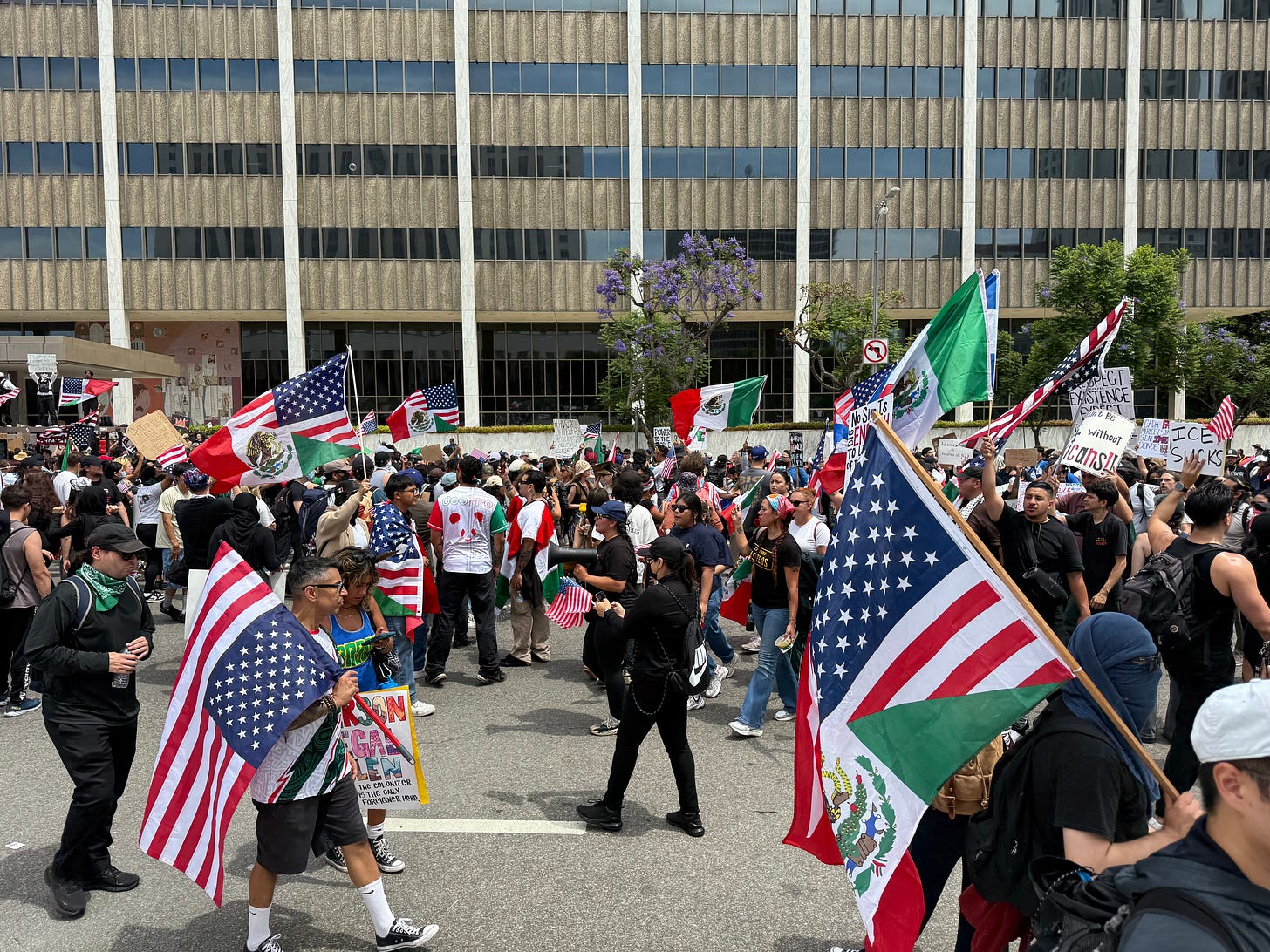Journalistic objectivity at the protest
Leaving the notebook at home after 16 years at newspapers
Last Saturday I attended a protest without a notebook in hand for the first time in my 18-year journalism career. Instead I carried chow mein and egg rolls.
Paul’s Kitchen was on the way to the downtown Los Angeles No Kings protest, so I stopped by to check in on owner Charlie Ng, 76. It’s been 9 years since I interviewed him for a story about City Market Chinatown, but I’m the only one who looks older. The pandemic took a lot of his customers, but he’s still razzing the ones he has left, extracting promises to return for lunch the very next day from everyone who comes in.
When he heard I was bringing food to the protest, he refused to take my money and gave me a set of extra plates and forks.
I parked in a Spring Street structure and walked to the beat of drums, chants and helicopter blades, takeout boxes in hand.
For most of my career, carrying a notebook at a protest was not about having somewhere to write. Pen and ink was already an anachronism when I started at my college newspaper in 2006. But the notebook marked me as a reporter and defined my role: to fill it with quotes and observations that might help the newspaper tell the story.
I always found protests to be frustrating assignments because there was so much pressure to get it right and so many things to get wrong. Was there truly a single correct way to describe massive collective performances that are spun and broadcast to thousands of fragmented audiences? City blocks become canvases for any and all political narratives. Many take advantage of the anonymizing garb protesters wear - tied scarves, black hoods, KN95 masks - to manipulate public opinion.
News staffers have to unravel this giant knotted mass of motives and opinions into a single narrative. Key parts of that report must rely on information volunteered by city hall and the police department, each institution pushing their own narratives.
No matter how much shoe-leather you fray, you will end up with a story that fails to capture most of what happens and pisses a lot of people off.
Your progressive friends judge you for “remaining silent” though, that is a part of your job. Your conservative friends assume you are a part of the deep state. Your parents assume you’ve been teargassed.
I found it vastly preferable to attend a protest with a box of free Chinese food. A few steps into Grand Park, I handed it off to a group of kids in Mexican flag garb, one of whom apparently smelled the chow mein and began to comment on it through his loudspeaker when I was more than 30 feet away.
I came because I was outraged and disgusted when federal officers assaulted Senator Alex Padilla for trying to ask a question. ICE agents body slammed and hogtied him knowing that he was a senator with every right to be there. Then the United States Secretary of Homeland Security spent the next few hours going on TV and lying about what we could all see and hear on video, from multiple angles.
Working journalists aren’t supposed to participate in protests. But Padilla’s manhandling was such a clear indicator of tyranny that I had decided to go even before I knew what I would write.
I felt an overpowering sense of crisis that made my reservations about the imperfect public relations strategies deployed at protests look petty. What was urgent before had become an emergency, and that transformation reordered my priorities in an instant.
That feeling was something I never grasped as a reporter. Protest is emotional. It’s what happens when people get so pissed off there is nothing - no office to call, no link to reshare, no vote - that can satisfy their outrage except immediate action.
It would have made my job a lot easier if protests had all been orderly debates about democracy and free speech, full of verifiable detail and quotable sound bites. But it was foolish to expect my interviews to produce a cogent thesis of societal change or a satisfying justification for the broken windows and graffiti.
Protests are not meant to serve as arguments for change. They are the urgent, overflowing emotion that sustains it.
Like emotions, protests don’t go away if you beat them in a debate. You can’t demand that they take a certain shape. They might burn violently at first but they can also cool and harden into something lasting. That’s what I saw this past Saturday at the No Kings protest, which nationwide drew an estimated 5 to 7 million people, one of the largest demonstrations in history.
I’m not calling for all journalists to participate in protests and abandon objectivity. The irony is that every time I sincerely engage with an issue, I’m forced to employ some form of neutrality, even if I find the term nebulous.
By now most of us can agree that pure objectivity is a fiction; that those invoking it often use it as cover for expressing white or majoritarian perspectives; that the current practice of it produces unsatisfying, both-sides journalism that perpetuates false equivalences and disguises bias as fact.
But I never thought these critiques proved we should abandon the concept entirely. They suggest to me that the demand for journalistic objectivity is emotional and contextual, not unlike protest.
How do you convince people of all ages, genders, nationalities and politics to share their genuine thoughts with you? How do you combat their negative experiences of your institution and profession?
Reciting policies and declaring your neutrality isn’t enough. You have to convince people face-to-face. That requires the application of some highly subjective human qualities, and your path to establishing trust changes depending on your audience and identity.
But it almost always starts by proving that you have a greater agenda than your own self interest. Your desire to listen and understand has to be greater than your desire to speak up and be heard. That involves performing some kind of objectivity.
It will always be harder to convince others of your neutrality if you’re posting your opinions on social media and marching in demonstrations. I’m not writing this because I’ve discovered some way to reconcile journalism’s objectivity demands with my democratic duty to protest.
I’m just writing this because I’m pissed enough. And I’m certain that at some point during the Trump administration, some domino inside you will fall and you will be, too.





Thanks for attending the protest and thanks for writing this up. I don't know if "fairness" is fully the right word I'm looking for with coverage on these sensitive situations, but as one of those things that seems to be "I'll know it when I see it", I'll value one's application of journalistic objectivity if I see it paired with fairness.
Here's hoping our mass protests do "harden into something lasting," such as electing actual leaders we can trust who can also galvanize us into a movement for humane, debt-free government.